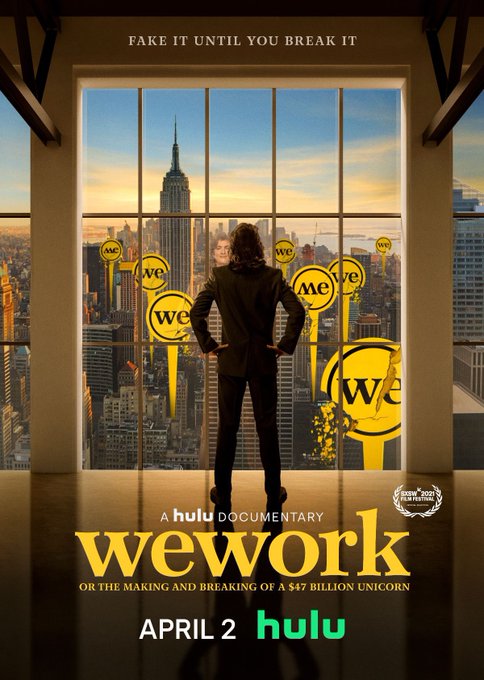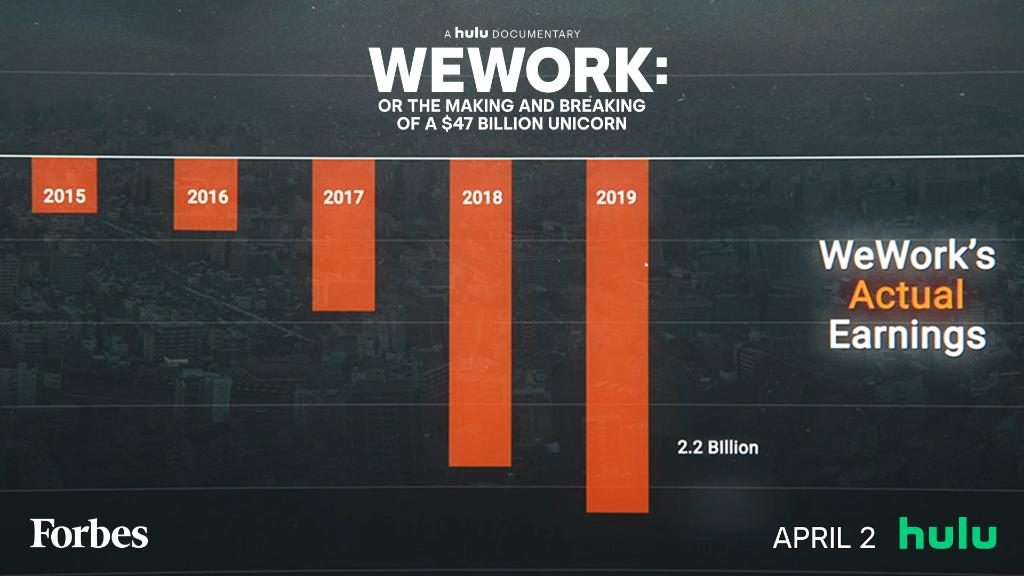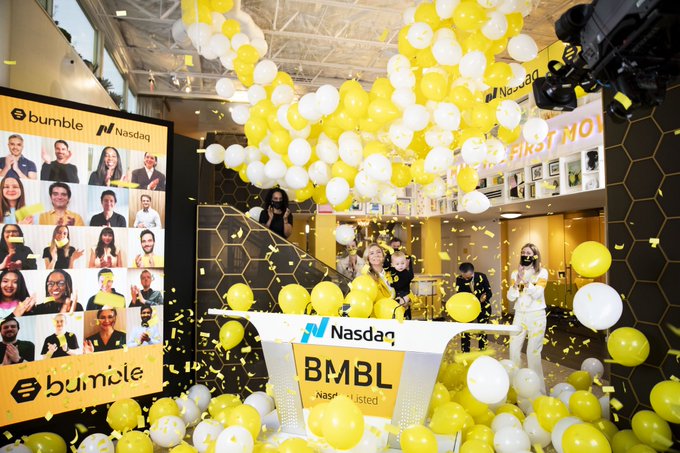
WeWork is one of the greatest Icarus stories of modern business history and it ties in everything from bubbles to capital to startup culture, according to Randall Lane, editor of Forbes.
“It’s got it all,” Lane said.
WeWork, a real estate company, skyrocketed to a $47 billion valuation and then nosedived to near bankruptcy within a span of a few months.
Lane, who is also one of the narrators in the documentary, spoke on a panel discussion at South By Southwest on Wednesday night after “WeWork: Or The Making and Breaking of a $47 Billion Unicorn” debuted at the SXSW Film Festival.
Forbes Entertainment partnered with Ross Dinerstein’s Campfire, and Olive Hills Media in making the feature-length documentary, which will begin airing on April 2nd on Hulu. Lane led an online discussion about the film with Dinerstein and the film’s director Jed Rothstein.
The movie starts out with Adam Neumann farting while repeatedly trying to give an investor pitch about the company. That kind of sets up the audience for the unconventional and weird tale about to unfold.
“The next revolution is going to be the We revolution,” said Neumann, co-founder of WeWork, quoted early on in the movie. “And it will restore in each one of us a sense of dignity and community without which greatness cannot be achieved.”
The movie centers around Neumann, a tall gangly fellow who served as the hippie-messianic leader of the WeWork empire which consisted of brands WeWork, coworking, WeLive, co-living and Rise by We, a gym. Neumann, an immigrant from Israel, teamed up with Miguel McKelvey to co-found WeWork in New York in 2010. McKelvey is rarely mentioned in the film although he does appear on stage in some shots with Neumann. McKelvey oversaw the company’s culture and operations. He also spoke at SXSW 2018. Both men grew up in communes.
At its height, WeWork had more than 600,000 members worldwide in 850 locations in 60 countries and 120 cities including Austin, which has seven locations including its latest location, the SXSW Center.
Neumann did not grant the filmmakers an interview for the documentary. It relies heavily on footage shot of Neumann taken during the company’s heyday with Forbes and other journalists and at company events. The documentary makers do interview key employees, journalists, experts, and others to get insight into the WeWork culture, its community, and the business behind it all.
“The movie is very serious, but it is also super fun,” Lane said.
WeWork also had a cult-like culture, said Dinerstein, who also was the executive producer of HBO’s docu-series Heaven’s Gate: The Cult of Cults.
“People want to be inspired. People want to be motivated. They want to be a part of something bigger than the whole,” Dinerstein said. “A lot of what Adam preached resonated with people. Heaven’s Gate is the same kind of thing.”
But Neumann also made a lot of promises to employees that did not pan out. Most people agreed to salaries lower than what they could make somewhere else and they worked long hours because they were given stock options, said Don Lewis, a former attorney for WeWork, quoted in the movie. Those stock options have not panned out as the company withdrew its Initial Public Offering in September of 2019.
Neumann is such a great salesman, and he is really charismatic, said Lane.
Neumann got carried away, said Rothstein, the film’s director.
“He got out over his skis,” Rothstein said. “He drank too much of his own Kool-Aid and believed the hype and got greedy frankly.”
Neumann’s story is an immigrant story too, he said.
“Adam didn’t come here with a trust fund and a Harvard education,” he said.
There’s a very American component to this process of faking it till you make it, Rothstein said. There’s a fine line between aspirationally talking about things that don’t exist and making them happen and lying to people. If you cross that line, that’s when you get in trouble, he said.
“You saw that with Elizabeth Holmes,” Rothstein said.
The 2019 documentary “The Inventor: Out for Blood in Silicon Valley,” debuted at the SXSW Film Festival also. It tells the story of Holmes, an attractive and charismatic entrepreneur who faked test results and lied to commit fraud on a massive scale in promotion of her medical device company.

Once an entrepreneur crosses that line, it’s no longer selling, it’s lying,” Rothstein said. “But at least in his heart, Adam was trying to do something that was worthy of being done. And I think it just spiraled.”
Dinerstein went into making the documentary thinking Neumann was a white-collar criminal and he’s not, he said. At the end of the day, he played by the rules, he said. He asked for money and people said yes, he said.
“He had the opportunity and he took it and that’s very much the American dream,” he said.
It was not fraud if he was playing within crazy rules, and that speaks to a much bigger story, Lane said.
Speculative valuations encourage companies to hemorrhage money to grow, and that’s what Neumann was doing, Lane said. Neumann convinced SoftBank Founder and CEO Masayoshi Son to invest $9 billion into WeWork from his $100 Billion Vision Fund. And in the movie, Son reportedly told Neumann that he wasn’t being crazy enough and needed to think bigger with WeWork.
“You can’t achieve outsize gain with timid business strategies,” Rothstein said. “You need to shoot for the stars. Obviously, it spun out of control and it didn’t work out and it got extravagant and crazy in ways that were unnecessary.”
The IPO revealed Neumann’s self-dealing acts like registering the trademark to the company and selling it back to the company and buying buildings and leasing them back to the company. Those things got a lot of attention from investors, Rothstein said.
The movie also underscores the idea of community and connection and how important it is especially highlighted by the Pandemic, Lane said.
“It became a really central question even from the first interviews we did that we were hungry for being together,” Rothstein said. The grand experiment of WeWork bringing everyone together became central to the story as we talked to more and more people, Rothstein said.
In the end, even ex-employees of WeWork, quoted in the movie, said they missed the community and the idea of changing the world for the better.










